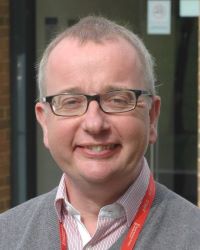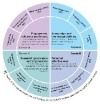Graduate School
The RVC has one of the largest veterinary graduate schools in the world. The Postgraduate Research Programme Management Team is the focus for postgraduate affairs within the RVC and is the first port of call for information for all postgraduate research students.
We support, administer and coordinate the recruitment and training for the MRes, PhD, Professional Doctorate, Residency and Intern programmes. It is the administrative hub for all research degrees, along with the Residency and Internship programmes - from initial enquiries to the award of degrees. Once you have joined the RVC as a research student, Resident or Intern, we will support you throughout your time with us, helping you to get the best possible postgraduate student experience and to ensure that all students fulfil their full potential at the Royal Veterinary College.
The Postgraduate Research Programme Management Team provides support across the RVC, by sharing good practice, and by ensuring that other College service-providers keep in mind the specific needs of all its postgraduate students when developing provision.
Our training programme and seminar days will support your studies and help to equip you with transferable skills as you develop and prepare for your future career.
The Team
The Team

Professor Ken Smith - Head of Graduate School and Professor of Companion Animal Pathology - ksmith@rvc.ac.uk Provides academic leadership for postgraduate research degrees and specialist clinical training programmes at the RVC. Ken participates in the recruitment of postgraduate research degree students and clinical training scholars; monitors student progression and completion; and works to enhance supervisor and postgraduate student training in project-specific and transferable skills. Working as part of a larger team, Ken liaises closely with the Vice Principal for Research and Innovation, the Vice Principal for Students, the Assistant Registrar for Postgraduate Management, the Postgraduate Programme Manager, and the Programme Administors for Postgraduate Research to ensure an excellent service for our postgraduate community.
You can contact Ken about
- Questions about internally funded studentships and other funding opportunities (e.g. Bloomsbury and LIDo schemes)
- Review of PhD proposals prior to advertising
- Participation in PhD student interviews
- Advice on academic progress and pastoral support for PhD students
Postgraduate Programme Management Team
- Adam Hall - Assistant Registrar for Postgraduate Management - ahall@rvc.ac.uk
- Lisa Harber - Postgraduate Programme Manager - lharber@rvc.ac.uk
- Rob Bacon - Programme Administrator (Postgrad Research) - pgadmin@rvc.ac.uk
- Rochelle Rozasty - Programme Administrator (Postgrad Research) - pgadmin@rvc.ac.uk
Essential Information
If you are either a prospective or current research student (PhD, MRes or Prod Doc) or a Clinical Training Intern/Resident you may find these regulations and codes of practice useful.
If you are a current research student or a Clinical Training intern/Resident you can also access this information via Learn.
Useful guidance for current and prospective doctoral students
Regulations and codes of practice
General information
Programme Specs and A&A Regs
Research Integrity
We expect all students undertaking a research project, however short, to recognise that it is their responsibility to conduct the research with rigour and integrity and to the highest possible ethical standards.
Research with integrity
We have prepared guidance - Research with integrity: guidance for postgraduate research students - to help you.
You may also find the Guide to responsible conduct in research - useful.
Skills Development Programme
During your time at the RVC your primary focus will be the successful completion of an original piece of research and the production of a thesis. However, Research Councils, and other sponsors and employers alike, are now expecting research students to be able to demonstrate that they have also developed generic and transferable skills to a high level.
Research students at the RVC are expected to take full advantage of the training (online and face-to-face) on offer and should be aiming to participate in the Training Programme and/or appropriate other professional and career development activities to an equivalent of 10 days per year.
Each training activity is assigned a number of points. Research students should be aiming to accrue 20 points per year (or 60-70 points over a 3-4 year studentship). A point is worth approximately ½ day of training: two weeks per year is therefore equivalent to 20 points per year.
As all training and learning is unique to the individual involved, we strongly recommend that at the beginning of each year you have a discussion with your supervisor about what training is most appropriate for you.
You should record the training events you attend/other forms of training you receive in your student log, together with the number of training points accrued each year, and be prepared to discuss this at annual appraisal.
Researcher Development Framework
The Researcher Development Framework was launched in September 2010 by Vitae and it is a professional development framework for planning and supporting the personal, professional and career development of researchers. It articulates the knowledge, behaviours and attributes of successful researchers and encourages them to aspire to excellence through achieving higher levels of development. It was developed by and for researchers, in consultation with academic and non-academic employers. The Researcher Development Framework is structured in four main domains, each including three sub-domains and further detailed descriptors. The RVC training programme for research students provides courses and events that cover all four domains: Domain A: Knowledge and intellectual abilities Domain B: Personal effectiveness Domain C: Research organisation and governance Domain D: Communication, influence and impact The RDF is set out in an abbreviated form below and the training and development opportunities have been mapped onto the 12 sub-domains of the RDF.

PhD Seminars
PhD Seminars take place on a regular basis and these, along with other training sessions are recorded using Echo 360 so that they can be accessed after the session
